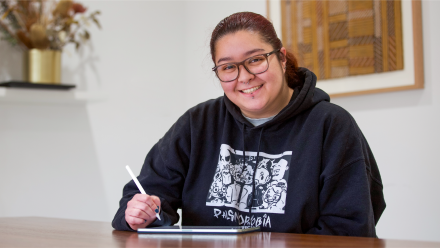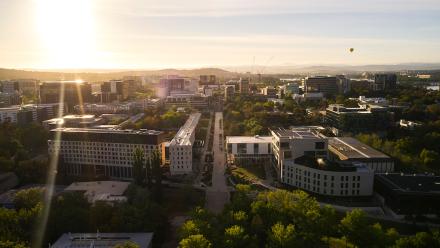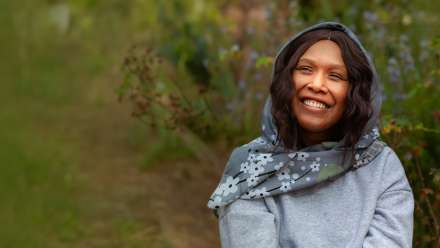Minoru Hokari: a journey with no end
"Exactly seven years ago today, on 10 May 2004, my brother Minoru Hokari (Mino), the author of this book, passed away in Melbourne. It was lymphoma. He was 32 and just about to start his promising career as a historian."
This was how Yuki Hokari began her heart wrenching and inspiring speech at the launch of her brother's book Gurindji Journey: A Japanese historian in the outback in 2011. Her speech allowed every audience member to meet Mino and invited us all on a journey to help continue Mino's life story, long after his death.
In 1999 Mino, a promising PhD candidate at ANU, set out to challenge the notion of how we define historians and history. He asked ten Indigenous communities for permission to stay in their community to learn about their history. Only the Gurindji people, who live 460km southwest of Katherine in the Victoria River region, accepted. Mino understood that they accepted him into their community and shared their stories because they expected him to spread their story throughout Australia, Japan and beyond.
Mino finished an English manuscript for the publication of Gurindji Journey soon after his PhD dissertation acceptance in 2001. However, before publishing it, he translated Deborah Bird Rose's Nourishing Terrains and co-translated Ghassan Hage's White Nation into Japanese. Then he was diagnosed with cancer.
After the diagnosis, Mino had only 10 months to live. In the final stage of his cancer Mino was moved to a hospice where he began writing a book in Japanese. He finished writing it a few days before his passing and the book Radical Oral History: Historical Practice of Indigenous Australians was published in Japan a few months later. This book, however, did not present the full depth and breadth of his research. It was more a collection of his thoughts and findings from various academic angles. It was meant to be an introduction to Japanese readers who are not familiar with Indigenous Australians. As Mino had intended, the book was widely read - not only by academics - but also by the Japanese public.
Gurindji Journey is the book that Mino promised the Gurindji people he would publish to deliver their story to the world. It is testament to Yuki's passion and tenacity that the book was finally published. Yuki explained at the launch, "I don't want to reveal too much of this book, so please read it from cover to cover, even the acknowledgments. Mino is not here to meet you, but you will meet him in this book." She went on to explain that all royalties from Gurindji Journey will be donated to the Minoru Hokari Memorial Scholarship at ANU.
Professor Ann McGrath, Mino's teacher and friend explains the purpose of the Scholarship, "Mino's historical research work created a bang, but so did the wonderful way he lived - a life of integrity, passion and a sense of fun he shared with everyone he met. The Minoru Hokari Memorial Scholarship is intended to assist other young people to follow their dreams and to perform work that spreads insights into Indigenous ways of thinking about history. When I think of Mino, I think of curiosity, bravery, joi de vivre, talent and drive. I think of achievement." The Scholarship is awarded annually to support a post graduate Indigenous history scholar who is conducting fieldwork at a recognised university.
The book launch held a special significance with the 2011 Scholarship winner, Glen Stasiuk, travelling from Perth to attend. Glen is an Indigenous PhD candidate and documentary film-maker from Murdoch University. His Scholarship topic is Swan River Colony (1829-1834): From Collaboration to Conflict. Glen explains, "I was both thrilled and surprised to learn of and receive the scholarship. It was an absolute honour to meet and spend some quality time with Yuki, and learn first-hand from her about her brother's kind nature and the legacy that he has left behind."
Glen goes on to explain that the Scholarship will complement his current documentary and PhD research project, which "is comprised of both a 50 minute documentary entitled WADJEMUP: Black Prison - White Playground and a written dissertation looking at Rottnest Island as an Aboriginal Prison from 1838-1931. The Island was where up to 4,000 Aboriginal men (and several boys) from around the State were imprisoned - and where an estimated 373 men died - making it the largest Aboriginal death in custody site in Australia's colonized history."
Glen highlights that his family has had a great influence on his life and education, "I grew up in Perth (Wadjuk Noongar Boodjah) to a Noongar mother (and matriarchal family group) and a Russian father. My mother was the first of her Noongar family to graduate from high school with her leaving certificate and I am proud to walk in her footsteps academically. My father's family came from war-torn Ukraine and Russia, and their journey inspires me to stand up for what I believe in and to keep being proud of who I am and who my family were before me. My grandmother is a proud Noongar woman and has seen much change in our people, community and society in general. She inspires me to tell stories that highlight the difficult conditions that her generation had to endure so that my own and my children's generations can both appreciate and reflect on the struggles of our ancestors."
On Mino, Glen says "I have purchased and read Minoru's book and his writing is both honest and enlightening. I hope that my research and paper will also be judged this way."
The establishment of this Scholarship, with the help of Mino's friends, was just one part of Yuki's mission to ensure her brother lived to 40. Before his death Mino wrote, "although I know this is selfishness on my part, I cannot begin to tell you how much comfort I take in feeling connected with all of you, my dear friends. So please stay connected with me, whether by remembering me in your prayers, by simply thinking of me or by mentioning me in conversation - it doesn't matter how. Please do not abandon me to my isolation. Who I am now exists in being connected to you, and that connection is what has supported me all these years and is supporting me now."
Other parts of Yuki's mission have included creating a memorial website, holding exhibitions of Mino's photography across Japan, publishing Mino's Japanese newspaper essay Conversations and publishing his two Japanese translations.
Yuki says "it would be easy to establish the Scholarship on my own and leave it at that. But my fundraising efforts and activities are there to encourage people to get involved and feel connected to Mino." And that is exactly what she has achieved. Her efforts have inspired many others to act, including the planting of a gum tree on the ANU campus in Mino's memory by his friend Tessa Morris-Suzuki and a group of his Japanese friends holding roundtable discussions that provoke thought about how to succeed his Historiography.
Even though Yuki has now celebrated Mino's 40th birthday, she is continuing her mission to find new and creative ways to help Mino's life flourish. One of her latest activities is 'Knit to Fundraise' where she sells her original knitting patterns to raise funds for the Scholarship. The project is run under her label - 'Nimara & Japarta'. 'Japarta' being the skin name given to Mino by the Gurindji People and 'Nimara' their name for sister. Each of her designs are beautifully formed and are dedicated to Mino with names like 'A Long Loop for Mino', 'Dreaming', 'Boomerang' and 'Songlines.'
While Yuki knows that some people may have lost touch with Mino over the years, she feels comforted that the Scholarship and her other efforts will continue to introduce Mino to new people.
At the end of Mino's thesis he wrote: "I threw a petal. Let's wait for the bang." Now looking back, it is clear that Yuki did the same with her vision for his Scholarship - now we wait to hear the bang.


